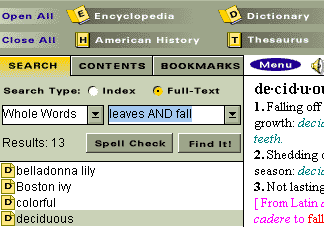

See also the Summary Rating Table for comparisons with CD Encyclopedia, and the SuperKids Buyers Guide for current market prices of this PC-only title.
 Pentium90 with 24MB and 2XCD
Pentium90 with 24MB and 2XCD
Content
Mindscape's Student Reference Library (SRL) contains the "Concise Columbia Electronic Encyclopedia" as one of ten complete reference works on the same CD. The other nine include: a dictionary, a thesaurus, an almanac, a style guide, an American history reference source, a book of quotations, and two atlas'.
With this vast array of resources, we felt many parents and students would be tempted to solve all their reference needs in one tidy package. Based on our reviewers' experience with just the encyclopedia and dictionary, we'd discourage that idea.
If the first question a potential buyer of a CD encyclopedia should ask is, "Does it have answers to the questions my kids will ask?" the answer for SRL in our test was no. SRL received the lowest score in our kids' research trial, finding a partial answer to just one of our four test questions.
SRL provided information relevant to the answer for our physical science question from a senior high student ("Why do some buried organic materials become coal, while others turn into oil?"), noting in separate entries for 'coal' and 'oil' information about their formation. Unfortunately, SRL had no success on a natural science question from a first grader ("Why do leaves fall off trees"), a biology question from an eighth grader ("Why does hair turn gray?"); and a history question that stumped all the programs we reviewed ("How did the ancient Greeks make perfectly cylindrical pillars?").
Ease of Install / Use
SRL installed without difficulty on our test machine. The installer prompts the user only for a drive:directory location for the installation, and then asks if an internet connection is desired. If so, the user can elect to use a pre-existing browser, or Spry Mosaic, which comes bundled with the program.
Once installed, the user accesses SRL's resources through a main screen that allows selection of resources, provides a search tool, and displays results. The user can elect to open all sources, thus producing the most complete -- but slowest -- search, or to identify specific sources for search. We chose to limit our searches for this evaulation to the encyclopedia and dictionary.
SRL provides a relatively complicated search engine. After deciding which reference works to search, the user selects either an index search, or a full-text search. An index search looks through the index of the selected volume. Not too tricky, right? But there's more. The user must also indicate whether the search is of entries matching the keyword, or beginning with, ending with, or simply containing the search string.
The full-text search option scans the scans the complete text of all articles in the selected reference works for the designated search. Here, the user has to decide between a "whole word" search, which searches for all words or strings which match the entire search text entered by the user, or a search for articles which merely "contain" the words or strings sought.
Users may also employ the Boolean search operators AND, OR, or NOT in full-text searches. These search operators are typically used to narrow the results of a search by making a search more specific. Unfortunately, this wasn't always the case with the searches we performed using SRL's search tool. Many of our searches produced expanded results rather than narrower results, because the search engine doesn't apparently recognize the Boolean operator NEAR. NEAR allows a searcher to specify that the search terms be found with some proximity to each other in the desired article. Without it, the unrelated occurrence of search words in a document results in false positive results. For example, when we entered "leaves AND fall" we were rewarded with an article on Central America which included the words "rainfall" and a later sentence using the verb "leave."
Internet Connectivity
Some of the articles in SRL offer additional information about the topic from the World Wide Web. These articles have an "online" button next to them; clicking on the button launches the user's browser, with the search term preloaded into a search engine such as Lycos or Yahoo.
Bottom-Line
The Student Reference Library is a great concept. Unfortunately, the encyclopedia was the weakest of the four we tested in this trial, both in terms of content, and ease of use.

See also the Summary Rating Table for comparisons with CD Encyclopedia, and the SuperKids Buyers Guide for current market prices of this PC-only title.
PC |
Macintosh |
|
| Operating System | Windows 3.1 or Win95 | not available |
| CPU Type and Speed | 486/66 or faster | |
| Hard Drive Space | 6.2MB | |
| Memory (RAM) | 8MB | |
| Graphics | SVGA, 640x480x256 color | |
| CD-ROM Speed | 2X | |
| Audio | MPC compatible sound card | |
| Other Needs | Windows compatible mouse |



 Buyers Guide /
Reviews /
Contents /
Sponsors /
Help
Buyers Guide /
Reviews /
Contents /
Sponsors /
Help
Questions or comments regarding this service?
webmaster@superkids.com
Copyright © 1996 Knowledge Share LLC
All rights reserved.